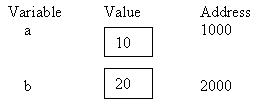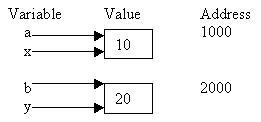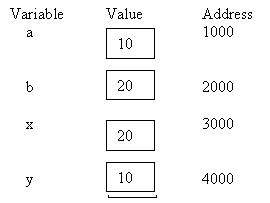In this method the reference variables of the actual arguments are created as formal
arguments. Reference variables are aliases of the original variables and refer to
the same memory locations as the original variables do. Since the formal arguments
are aliases of the actual arguments, if we do any changes in the formal arguments
they will affect the actual arguments.
For example (C++):
void swap(int &,int &);
void main ( )
{
int a,b;
clrscr ( );
a=10;
b=20;
cout<<"Before calling swap function: a="<<a<<" b="<<b;
swap (a,b);
cout<<"\nAfter calling swap function: a="<<a<<" b="<<b;
getch ( );
}
void swap(int &x,int &y)
{
int temp;
temp=x;
x=y;
y=temp;
cout<<"\nInside swap function: x="<<x<<" y="<<y;
}
Here in the main ( ) function we have declared two variables a and b with values 10 and 20 respectively. So we have in memory:

When we call the swap ( ) function by address, two reference variables x and y are created and they are alias names given to a and b respectively. So we have in memory now:

Inside the swap ( ) function we have interchanged the values of x and y. Since x and y are aliases of a and b, any changes made to x and y will affect a and b. So after swap function we have in memory:
